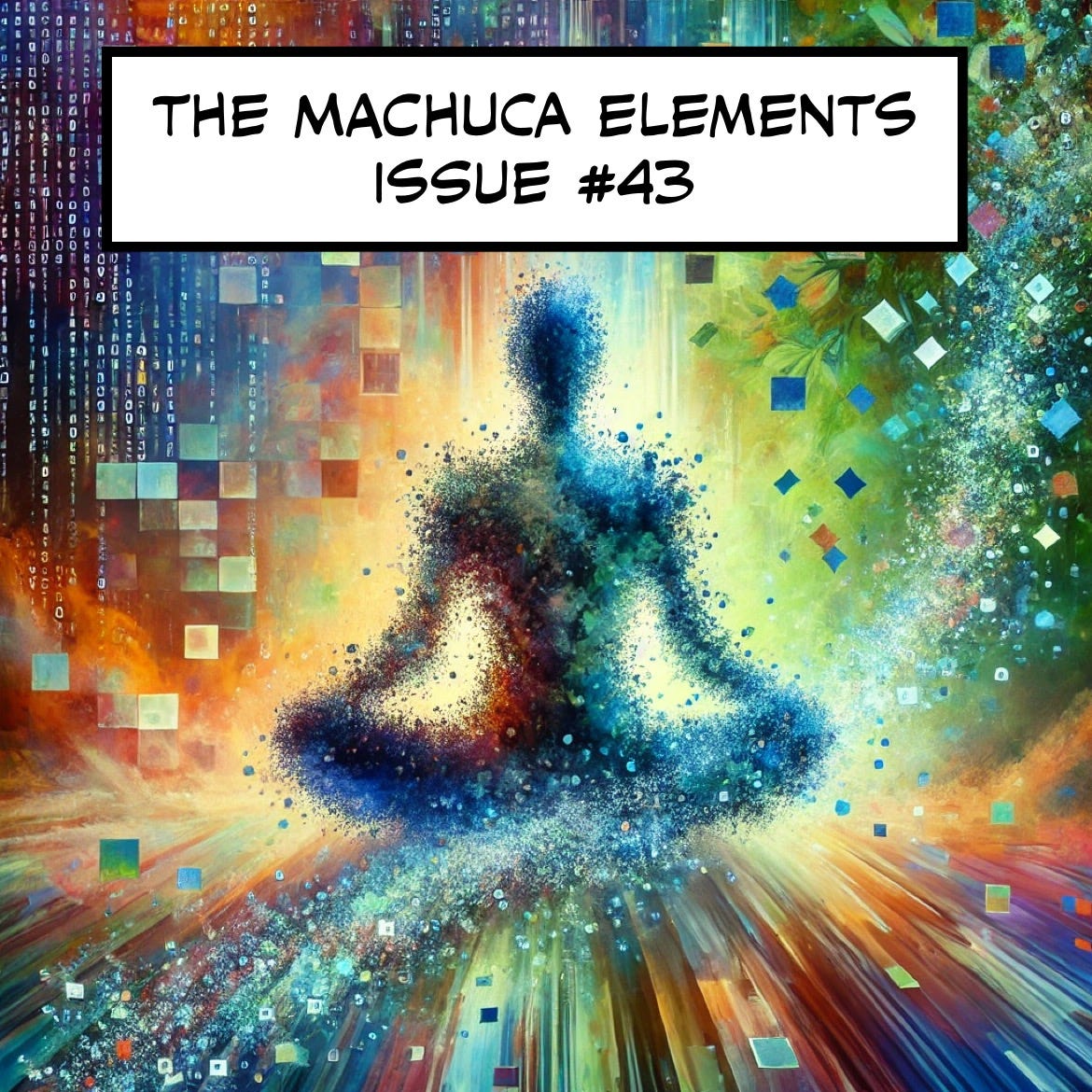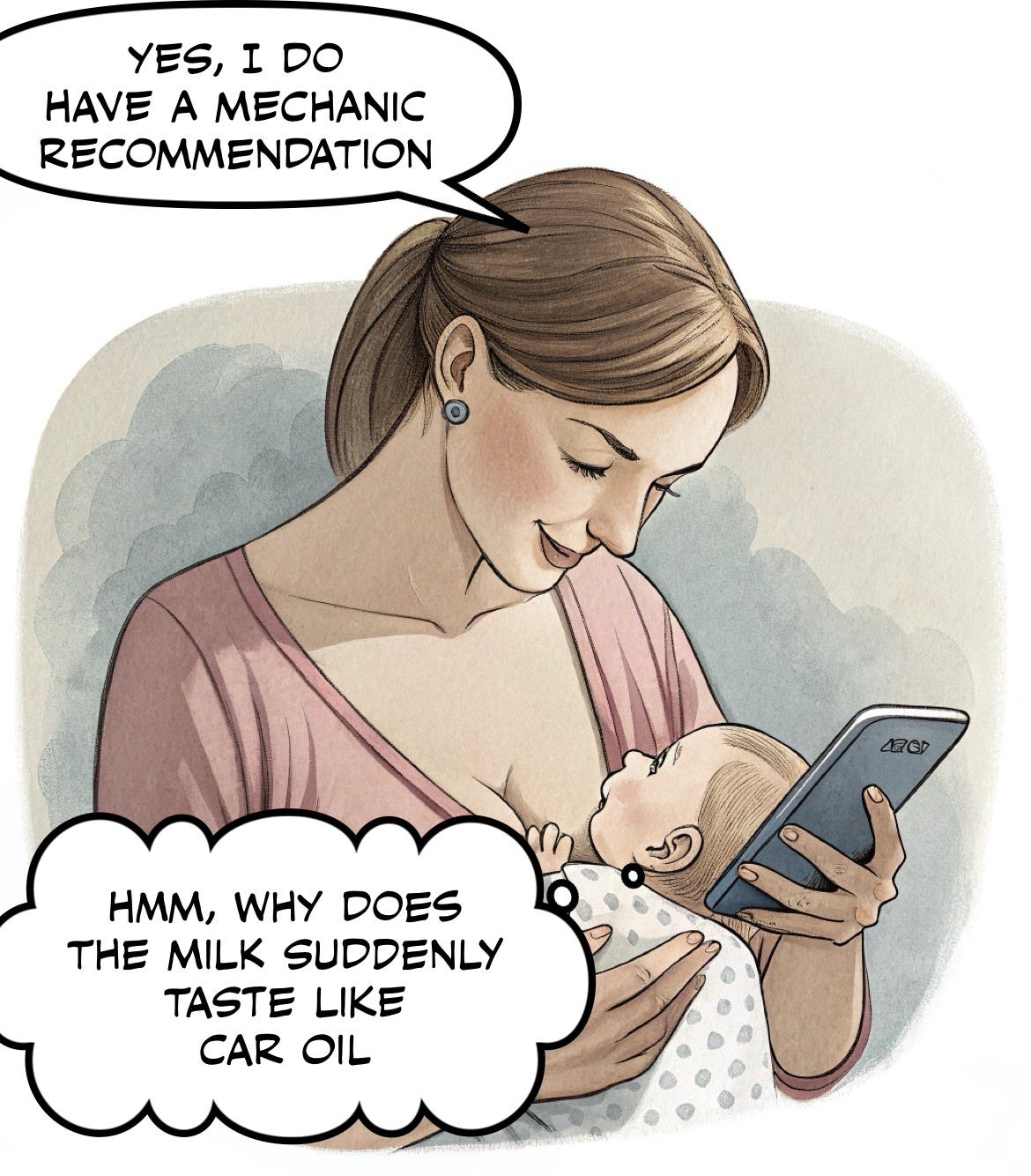Issue #43: Disconnect to Reconnect - How I Unplugged by Julianne Taza
A common theme of this newsletter is connection to nature and disconnection from screens. We covered this topic twice last year:
Yet everyone is still reading these very words on a screen instead of our print-edition (I kid, but we can try…) Today we bring another inspiring story of disconnection from our long-time resident Julianne.
By Julianne Taza:
Mid-December.
I felt something was off, but I couldn’t pinpoint what. Each day ended with me feeling more exhausted than usual. Yet, when night came, I had trouble falling asleep. A thousand thoughts raced through my mind all day long.
One day, while breastfeeding my baby, I glanced at what was lying in my hand—and it all clicked.
The phone.
The goddamn phone!
It suddenly struck me: I had let myself become increasingly disconnected from life because of a cellphone addiction.
I was taking my phone everywhere, checking it as if it were a newborn that needed constant attention. I felt I needed to always be reachable and to reply promptly to the dozens of WhatsApp messages I received daily. The sight of unread messages piling up made me anxious, like I was being haunted by tiny red dots. I couldn’t go to bed without clearing them all, yet doing so devoured a huge portion of my day.
That constant dopamine rush from notifications had me hooked. Once an avid meditator, I now couldn’t bear my own inner silence. I even listened to podcasts in the shower. Who needs mindfulness when you can learn about the danger of mold exposure while shampooing, right?
On a more serious note… I found myself asking: how could I possibly feel centered and present with my family when I was constantly distracted?
Something had to change.
I needed to change my relationship with that gadget. I knew I needed to start with a full detox. As my beloved life partner likes to say, I tend to be a little extreme sometimes. But in this case, complete abstinence felt necessary for long-term change.
I began with a weekend away with my family, during those days between Christmas and New Year’s when time seems to pause and no one really expects an answer (my phone is also one of my work tools, so this timing was crucial). I brought neither my phone nor my computer and, for the first time in months—or even years—I felt profoundly present. The constant brouhaha in my head started to vanish.
When waiting for others, I meditated (what else was there to do?)
When nursing my baby, I gazed at him and fell deeper in love.
When eating, I focused on my food, savoring every bite with slowness and intention.
When ideas surfaced, I journaled them, with an actual pen and paper (remember those?)
At night, I meditated again before falling into blissful sleep.
On the way home, I knew this weekend was just a taste of something bigger.
“No phone until February,” I heard my higher self say.
“February?!” my partner exclaimed. “Isn’t that a bit extreme?”
But I was confident. Back home, I set everything up so I could continue working and staying connected with loved ones—just, without my phone.
The phone went straight to the closet, and I allowed myself to use only my computer.
I discovered the beauty of intentionally sitting down once or twice a day to work, respond to emails and messages, and handle tasks. Afterward, I disconnected completely for the rest of the day.
We used to live like this, didn’t we?
Sure, it’s hard to imagine navigating without Google Maps now, but we once relied on paper maps and still managed to find our way (well, most of the time). Lovers wrote each other letters. Announcements were made on whiteboards, not in endless group chats. On road trips, we gazed out the window and sang. Okay, maybe we still sing, and I’m being overly nostalgic—but you get the point.
The Lessons…
Going forward, my phone stays in the closet unless I need it for something only a phone can do, or if I’m leaving the community and need it for safety or practicality. Even then, I try to stay conscious not to overuse it—it’s all too easy to slip back into old habits.
This small change has made a huge impact in my life. I hope that sharing my experience sparks something in you and inspires you to reflect on your own phone habits and how they’re shaping your life.
To conclude…
I’d like to extend a challenge to our entire community. On Saturday February 1st, I’m inviting the whole Machuca Valley to join a community phone detox. Let’s dive into a device-free day together and explore what it means to reduce our gadget addiction as a community that relies heavily on WhatsApp for… well, absolutely everything.
Are you in?
Let’s start strong, no WhatsApp group needed. Just leave your phone alone for the day.
Let’s rediscover together what it feels like to be truly present, and who knows… we might just start a movement.
Me and Julianne discussed providing actionable digital detox “tips” and we have a long list! However, after thinking about it, we’d like to share an excerpt from a Newsletter I follow that does a great job delivering the same points.
By Craig Mod from his Roden Issue #99:
Distractions / Attention
Does it feel like the last ten years were especially tough for holding onto control of your attention? As if the mass “weaponizations” of attention monsters is only growing? Exacerbated because it feels like there are no adults in charge of anything? And that the forces at play feel less social or political and more like capricious acts of nature? Of the ficklest of fickle gods? And so burying your head in a mobile game consisting of popping colorful blobs pacifies a weary soul? And that walking through a subways station is a chance to inhale yet another few Reels? And an escalator — no longer primarily a machine of conveyance, but an opening for another few seconds to blob-pop rather than look around and ponder the majesty of The Mezzanine?
Over the years, I’ve written a bunch of essays on attention and not being subject to the whims of the algoz:
How I Got My Attention Back (2017)
The ‘Rules’ of Walking (2022)
I don’t know how much life you get back by disconnecting from the streams of Content Slop, but I suspect it’s a lot. And most productive, successful people (especially artists, writers) are very, very good at disconnecting, at not allowing their gaze to be sucked up by the machine. There’s absolutely no way I could have done as much as I’ve done in the past five years without being deliberate about disconnecting.
I haven’t slept with a phone in my room in over a decade. (The weirdest flex, yes.) If possible, I don’t sleep with it on the same floor. Chatting with Simone Giertz a few months ago, she had a brilliant idea: what if the only way to turn on the electricity in your home was to dock your phone at the front door? Me, I dock it in an avoidable corner to charge so that I don’t accidentally see it when I get up. I try my hardest to not look at it until after lunch (a phone-free morning is something I’ve been writing about for 10+ years). But even if you can’t go that far, at least get it out of your bedroom. The only networked device (only screen) in my bedroom is a Boox Palma and I love it and still use it daily after about nine months. It has two apps: Readwise Reader (for whom I’m an advisor) and Kindle. That’s it. If I wake up in the middle of the night (which is thankfully rare), I just read a little on its gently-lit screen, and am soon re-slumbering. Your attention is powerless, gutted, anemic without good sleep. If you don’t have consistent, great sleep, good luck pulling your eyeballs away from the streams, from the slop, from the torrent of news. I find I’m most susceptible to their Siren call when I’m exhausted.
Folks concoct all sorts of crazy reasons for keeping their phone in their room, the weirdest being “it’s my alarm clock.” Just buy a nice little Braun. (The iPhone alarm is famously inconsistent, anyway.) Or buy a HomePod Mini and keep it next to your bed. (Hey Siri, wake me up at eight.) If you’re worried about missing emergency calls, you can also have the HomePod notify you (I think?). I find even the mere presence of the phone changes the way my brain feels — and so not having it in my bedroom is a cornerstone to sanity.
On my Mac, I’ve been using Freedom (imperfect but works) for years to great effect. (Robin Sloan is also a productive, once-professed fan (not sure if he’s still using it, though).)
Recently I bought a BRICK — it’s a little NFC doohickey that allows you to “brick” your phone — that is, turn off a bunch of “fun” / addictive apps. You tap it when you leave the house and your phone is rendered boring. And you tap it when you come home and it can go back to eating your soul and sleeptime. An open source version of BRICK was recently released that I plan on investigating: Foqos. The only modification I’d love to make to BRICK/Foqos is the ability to “unlock” the apps for five minutes a day without the NFC tap. That’s all you need, IMO. Five minutes on Insta or Threads or Bluesky or whatever is probably enough to check in and get out. Anything else is pure diminishing returns.
What about news?, you say: My favorite way to get news is to ask a little Homepod Mini in my kitchen to “play the latest BBC global news podcast” as I make breakfast. The bonus: for the BBC, the world is more than just the US, so you get a broader sense of what’s happening than standard American news sources, and the chaos factor of the States is diminished.
Older readers may be thinking: Why are you so weak? (As a friend said to my face the other day.) Weak? Weak?? Hell yeah, I’m weak. It’s delicious, that sloppy feed, in the same way a “chicken” sandwich from McDonald’s is delicious. Ignoring that, or self-shaming into not “being stronger” is to let the soon-to-be-trillionares win. Don’t diminish your efforts, just be smart about how you control your attention. The goal is to increase the “fullness of days” — something utterly incompatible with feed slurping.







